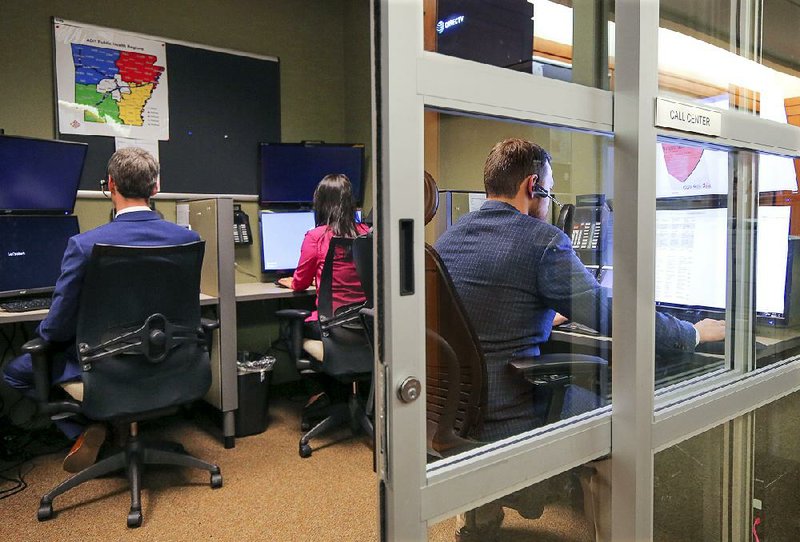Arkansans contemplating suicide can now talk to crisis intervenors in Arkansas when they call the National Suicide Prevention Lifeline.
Before Dec. 11, Arkansas was one of only two states rerouting calls to hotline call centers in other states. Advocates complained the situation prolonged wait times and prevented vulnerable callers from finding the best local resources.
The Arkansas call center, which opened last month in the Arkansas Department of Health basement, is the first in the country to be operated by a state health department; most are run by nonprofits.
At the call center's official unveiling Tuesday, Dr. Nate Smith, state Health Department director, said the new call hub will ensure that callers are connected with the best services and support closest to them.
"We're hoping this can become a model that health departments in other states can follow," he said.
Fewer people died by suicide in Arkansas in 2016 than the year before, according to U.S. Centers for Disease Control and Prevention data. In 2016, which is the most recent year for which the agency has compiled data, 555 people in Arkansas died by suicide, down from 571 in 2015. Those numbers include people from out of state who died here.
The Natural State had the 14th-highest suicide rate per 100,000 residents, CDC data show.
State lawmakers in 2017 passed legislation mandating the creation of a suicide hotline call center within the Health Department.
In its first month and a half of operation, the center has answered 900 calls, Smith said Tuesday. The center is staffed with up to three people 24 hours a day, and it's part of a network of more than 150 centers connected to the National Suicide Prevention Lifeline.
Suicide is the leading cause of violent death in Arkansas, doubling the number of homicides in the state, according to the Health Department. In 2016, 67 deaths of Arkansans ages 10-24 were attributed to suicide, according to state figures.
Today, only Wyoming remains without a call center. Joe Martin, the Arkansas Health Department's injury and violence prevention section chief, said Wyoming officials have already reached out for advice on establishing a call center within their own state government.
Tyler West, a national American Foundation for Suicide Prevention board member who lives in Arkansas, said the Arkansas call center represented a great example of its residents stepping up to help one another. While there's more work to be done, a call center is a great start, he said.
"We're learning what interventions work and when they work," West said. "The lifeline has been proven to save lives."
Looking forward, West said that advocates in Arkansas must focus on developing intervention strategies for groups of people who are particularly vulnerable to suicide -- like veterans and first responders -- and ensure the call center remains funded.
The law, sponsored by Rep. Bob Johnson, D-Jacksonville, mandates the call center be maintained "to the extent that funding is available." The center is funded by a federal grant and, while Health Department officials don't expect that grant to go away any time soon, some advocates are concerned that the call center could lose its funding in the future.
Martin, the section chief over the call center, said the department is already searching for sustaining funding, adding that the agency is committed to keeping the center.
None of the lawmakers who sponsored the call center legislation were at Tuesday's unveiling. Johnson said he wasn't invited and was disappointed the Health Department didn't reach out to him or his fellow legislators.
He said it was exciting to see the local hotline come to fruition. Johnson has announced that he won't run for re-election, choosing instead to run for mayor of Jacksonville.
If call center funding was ever endangered, Johnson said he'd like the Legislature to provide permanent funding, noting that the center is not very expensive to maintain.
Call takers assess the level of risk for each caller, and they can determine whether emergency personnel should be dispatched. Concerned family members and friends are also encouraged to call the hotline for advice.
According to advocates and researchers, suicide warning signs include: talking about wanting to die, looking for a way to kill oneself, talking about feeling hopeless or without purpose, talking about being trapped or in pain, increased alcohol or drug use, talking about being a burden on others, sleeping too little or too much, withdrawing or feeling isolated, showing rage or discussing revenge, extreme mood swings and acting anxious, agitated or reckless.
If such indicators are present, researchers and advocates recommend staying with that person, removing any firearms, alcohol, drugs or sharp objects that could be used in a suicide attempt and going to the emergency room or seeking help from a mental health professional.
The National Suicide Prevention Lifeline can be reached at 1(800)273-8255.
Metro on 01/31/2018
